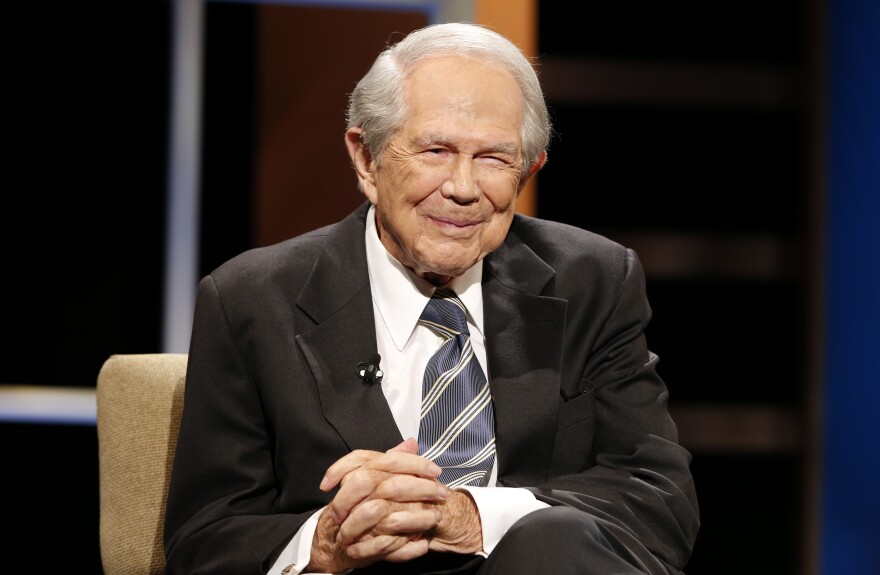Updated June 8, 2023 at 11:04 AM ET
For generations of conservative Christians, Pat Robertson was a familiar face on television, guiding them through domestic politics and international affairs on his long-running talk show, The 700 Club.
But the controversial televangelist was best known as an architect of the religious right who frequently made anti-gay remarks, as a pioneer in the Christian broadcasting industry that would elevate many Republican politicians, and briefly, as a politician in his own right with presidential aspirations.
In a statement Thursday, the Christian Broadcasting Network said Robertson died at home on June 8, surrounded by family.
From pastor to political force
The son of a powerful U.S. senator, Robertson grew up around politics. But his roots were in the white evangelical Christian church, as an ordained pastor. In 1960, he founded the Christian Broadcasting Network, or CBN, in Virginia, holding telethons to pay the bills. The network and its programs would eventually spread around the world.
CBN's success spurred Robertson to found a Christian college, now known as Regent University, in Virginia Beach in the late 1970s. A decade later, he set his sights higher, making a run for the 1988 Republican presidential nomination as both a social and fiscal conservative.
Though his campaign was unsuccessful, it elevated Robertson's profile among politically engaged white evangelicals. The following year, Robertson founded the Christian Coalition in an effort to mobilize those voters.
Ralph Reed, the former executive director of the Christian Coalition, said Robertson was very skillful at building up the political muscle of the Christian right and rallying voters around the issues he cared about.
"It is undeniable whatever one thinks of his politics — and I was fortunate and privileged to be at his side — that he transformed the Republican Party and with it American politics," Reed said.
At that time, another group with a similar mission was dissolving. The Moral Majority was founded in the 1970s by another politically conservative, Virginia-based minister, Jerry Falwell. His son, Jerry Falwell Jr., is the former president of Liberty University in Lynchburg, Va. In an interview with NPR in 2017, Falwell Jr. said Robertson was influential in coalescing the voting power of the Christian right.
"They had a huge impact," he said. "I guess their main impact was bringing Christians together as a political force, to work together."
A charismatic, divisive leader
Robertson's critics, such as Terry Heaton, also have remarked on his ability to command a following. Heaton was a TV producer for Robertson in the 1980s, eventually rising to the role of executive producer for The 700 Club.
"People don't realize how brilliant Pat Robertson really was at that time," Heaton said.
Heaton is the author of The Gospel of Self: How Jesus Joined the GOP, a book critical of the Christian right. Heaton told NPR in 2017 that Robertson wrote the playbook many others in conservative media would later follow.
"We guided people into Republican Party politics, because Pat Robertson frankly, [was] a politician who happened to be a televangelist," Heaton said.
Robertson's reach extended to the White House, where he interviewed presidents including Ronald Reagan. Decades later, like many leading figures on the Christian right, Robertson became a supporter of Donald Trump. While visiting Regent University during the 2016 campaign, Trump called Robertson a "great gentleman," adding, "the job he's done is incredible."
The Rev. Rob Schenck worked alongside Robertson and other evangelical leaders for years before breaking ranks with many of them. He says Robertson was a mentor and cited the charitable work that Robertson did through an organization called Operation Blessing, which deploys teams to help with emergencies such as natural disasters and COVID.
Schenck also says he believes Robertson bears a lot of responsibility for the politicization of his faith ... and that his impact on the culture was largely damaging.
"Pat very much was a force behind the very conservative politicization of American evangelicalism, and to me that has been very damaging," Schenck said. "Particularly his support for Donald Trump. In fact, it was at Pat's 80th birthday party that I first encountered Donald Trump, other than in the media, in person, when he was Pat's guest of honor for that festive occasion. And it shocked me because I thought Donald Trump stood for everything opposite for what a Christian should support."
In his later years, Robertson continued to host The 700 Club, where he continued to draw controversy for comments that were often seen as anti-gay, and racially insensitive.
In a 2017 interview with NPR, his son Gordon Robertson said the criticism of his father was politically motivated and driven by left-leaning websites.
"That drumbeat ... I think has really shaped the public perception of him in a way that I, frankly, think is unfair," the younger Robertson said. "It doesn't take into account all the things that he's done. And by any standard, he's done some incredible things."
Copyright 2023 NPR. To see more, visit https://www.npr.org.





